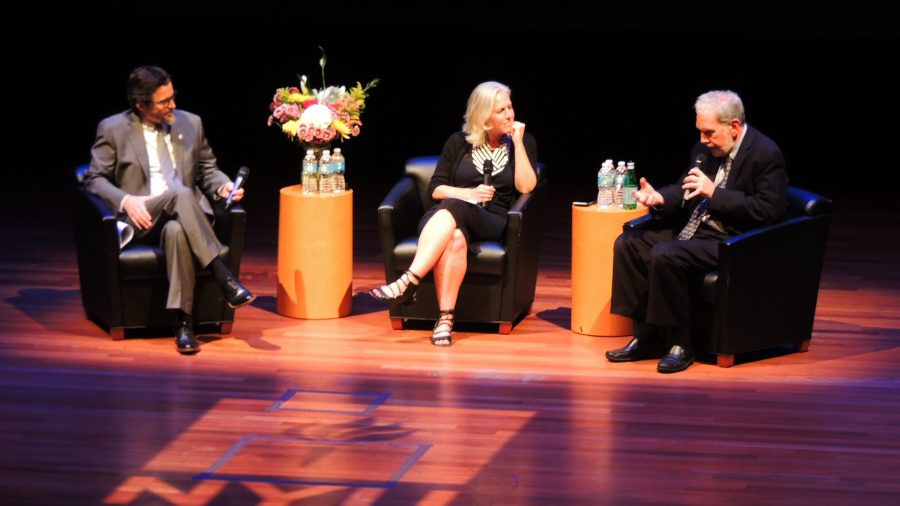Sexton Headlines Spirituality Lecture at Skirball
Former NYU President John Sexton returned to the university this Tuesday for a panel in Skirball.
September 28, 2016
People began lining up outside Skirball over an hour and half before the annual Fritzi Weitzmann Owens Memorial Lecture hosted by NYU Global Spiritual Life on Tuesday. This year, the 15th President of NYU John Sexton and Zaytuna College President Shaykh Hamza Yusuf led the discussion while Reverend Dr. Serene Jones facilitated it.
Sexton stepped down from his post as president in January of this year after serving 14 years as the dean of NYU’s law school and another 14 years as university president. Although he vacated the presidency, Sexton is still active at NYU and continues to teach his Gallatin class “Baseball as a Road to God.” At the memorial lecture, he discussed “The Secular and the Sacred in Higher Education.”
Program Administrator of the Global Spiritual Life Ariel Ennis said that Sexton and Yusuf were invited to discuss the topic of religion in higher education because of their unique perspectives on religion.
“John was the president here — he is someone who cares deeply about religion personally and was the president of a secular university, but he did a lot of work with religion in that context,” Ennis said. “And Shaykh Hamza Yusuf started the first Muslim college in America.”
He said that the two hold interesting beliefs of how religious identities play out in higher education.
The 850-seat auditorium was almost full, and the majority of the audience was Muslim and Jewish. They listened to Sexton and Yusuf discuss topics such as the nature of the soul, suffering and consciousness as part of spirituality for over an hour.
Sexton discussed many ethereal topics such as the dimensions love and spirituality occupy in ineffable spaces.
“For me, the words ‘sacred’ and ‘profane’ are circular,” Sexton said. “If you try to make an explanation of them, there is no explanation beyond the experience of the person who is experiencing.”
He said that people cannot convince each other of individual standards of sacrosanctity or godliness, because these beliefs are enduring.
Medical student at the New York College of Podiatric Medicine Einul Chowdury found the broad range of topics, such as Sexton’s philosophical arguments, very informative, and he said that he did not know what to expect going into the lecture.
“The discussion about social justice was very interesting,” Chowdury said. “Talking about the historical context and how it applies to modern day and how we see them now was very interesting.”
Yusuf discussed the dangers of relying too heavily on empirical evidence, and he said that it contributes to a culture that places too much value on influence and money. This, he argued, drew the shift from seeking knowledge of the imperceptible as well as social, spiritual and physical healing.
Amy Beth, a friend of Weitzmann’s daughter-in-law, also enjoyed the talk. She thought that access to listen to their conversation was a scholarly gift to the audience.
“It was a beautiful confluence of — somebody used the term ‘public intellectualism’ — deeply religiously rooted extension of people’s beliefs brought into a place of familiarity so that we can extend and reach one another,” Beth said.
She liked that, prior to his speech, Sexton stressed that our goal as members of a simultaneously religious and secular community is not tolerance but dialogue.
Discussion of similar theological points continued after Yusuf and Sexton concluded their exchange, and the audience proceeded to consider their words as they exited the auditorium.
“There was just this incredible equalness in what they chose to discuss [and] what they brought to us as an audience,” Beth said. “I was so deeply moved by the true acceptance as all of us as important and equal.”
Email Coleen Nguyen at [email protected].



























































































































































